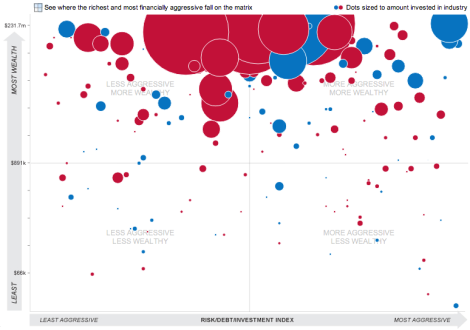The Washington Post has a nifty tool that allows you to see the investments of members of Congress. Which is not to say that a congressmember will necessarily act on behalf of the companies and industries they’re invested in. It is, instead, to say that if a congressmember did take action on one such company’s behalf and the company’s value increased as a result of that action, the congressmember would see direct benefit.
It is also to say that, yes, it happens.
A California congressman helped secure tax breaks for racehorse owners — then purchased seven horses for himself when the new rules kicked in.
A Wyoming congresswoman co-sponsored legislation to double the life span of federal grazing permits that ranchers such as her husband rely on to feed cattle.
And a Pennsylvania congressman co-sponsored a natural gas bill as Exxon Mobil negotiated a deal that paid millions for his wife’s shares in two natural gas companies founded by her great-great-grandfather.
Those lawmakers were among 73 members of Congress who have sponsored or co-sponsored legislation in recent years that could benefit businesses or industries in which either they or their family members are involved or invested, according to a Washington Post analysis.
Seventy-three of the 535 members of the House and Senate. That’s 13.6 percent.
The Post breaks down investments by industry. Below is a graph of investments in energy and natural resources — but see the interactive version for much more data. The size of the bubble is the amount of investment; the color denotes political party.
In dollar amounts, here are the 10 largest investors in the energy sector.
- Sen. John Kerry (D-Mass.), $16.2 million
- Rep. Trent Franks (R-Ariz.), $15.8 million
- Rep. Mike Kelly (R-Pa.), $15.2 million
- Rep. Darrell Issa (R-Calif.), $15.0 million
- Rep. Michael McCaul (R-Texas), $13.7 million
- Rep. Kenny Marchant (R-Texas), $5.5 million
- Sen. Mark Warner (D-Va.), $3.0 million
- Rep. Wally Herger (R-Calif.), $3.0 million
- Rep. John Carter (R-Texas), $3.0 million
- Sen. Joe Manchin (D-W.Va.), $3.0 million
Manchin you may remember as the coal industry’s best friend on Capitol Hill. Oh, and Kelly is the congressmember who sponsored the bill that benefited ExxonMobil.
The kicker here is that the rich have gotten richer since 2007 while the middle- and lower-income members of Congress have seen their worth fall — even in the hyper-rich world of Washington.

Class distinctions among the upper class. But I wouldn’t look for the lowest-worth congressmembers to stage Occupy-style sit-ins in the House office buildings any time soon. They have other tools at their disposal to make up the difference.




